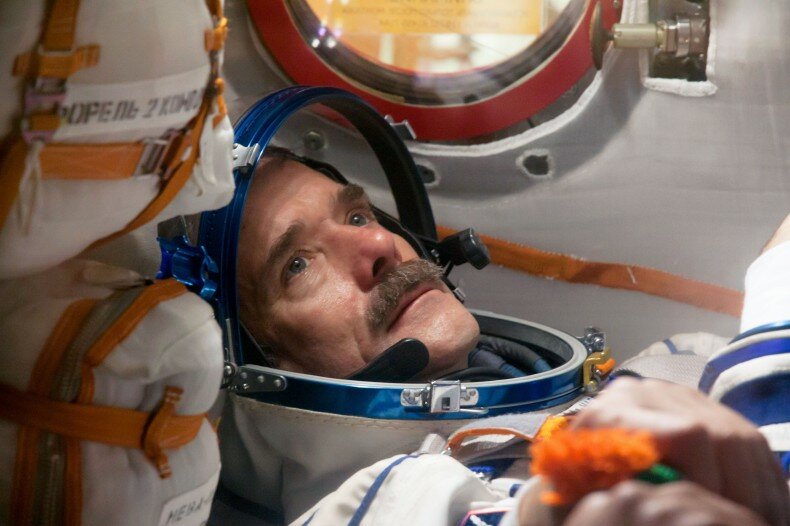By A Rahim Khan –
Pique’s Exclusive
Amidst the floating jetsam of laptops, cables and the occasional space suit, a Larrivee Parlor guitar is strummed by a somber looking mustachioed man, both suspended in animation, zero-g making the effort look easy. Crooning to the lyrics of David Bowie’s ‘Space Oddity, this chaunteur rides a vessel’ that is slowly falling towards the earth; the occasional glimpse of the planet through a porthole stark against the absolute black of space. Gliding through corridors, peeping in and out of cupolas, this singing astronaut does a rendition of the song that is literally out of this world, but for those who saw this video when it was first released back in 2013, a certain moment of disbelief, a certain incredulity was felt for this cover of ‘Space Oddity couldn’t really have been shot in space, could it?
Well, for Canadian astronaut Chris Hadfield, the performance was a very actual experience, played at a venue like no other. More than 300km above the surface of the earth, the International Space Station (ISS) has been orbiting the planet since 1998 and for the past 14 years has played host to astronaut crews from around the world, marking a truly human endeavor into the heavens. Commander of Expedition 35 to the ISS, Hadfield’s time aboard the space station was noted for his near-historic interactions with those back on earth; conducting the first live chat session from orbit, tweeting and sharing ineffable pictures from space and of course performing ‘Space Oddity’; the first ever music video to be shot in space, overnight turning the dour Hadfield into a celebrity. The video would go on to be viewed 22 million times on YouTube and heralded the return of the kind of lauded astronaut that the early years of the space race were famous for but Hadfield himself would beg to differ, being modest to a fault.
For him, this one of a kind performance was a fond farewell, an adieu to the ISS and indeed space itself, ending a 21-year career for the farm boy from Sarnia.
In an exclusive interview with Pique, conducted very much on the ground (yet alas interrupted by bad reception) Hadfield speaks about his inspirations, spaceflight and his experience aboard the ISS
What inspired you to become an astronaut? Was it something about your generation?
Chris Hadfield: I grew up in Canada, I was born in ’59, so the summer I turned 10-years old is the first time that two people walked on another planet and by that I mean the moon. For me that was in amongst that science fiction that was going on like Star Trek and 2001: A Space Odyssey. And then the science fact of two people being audacious enough to walk on the moon was a real inspiration for me and millions of other people.
Do you think that that particular spirit that inspired you is possibly missing today?
CH: No not at all. I mean I’ve spoke at thousands of schools and the same burning interest is everywhere I go. I’ve spoken to a sold out audiences. Gosh, I mean look at those two people in Holland that started the idea of Mars One for which over 200,000 people applied for a one way trip to Mars. I don’t think there’s anything missing, nothing’s changed, it’s fundamental to human nature.
What is it about space that keeps us wanting to go back?
CH: Well, I think there are two things in your questions that make me want to answer differently. Firstly, it’s not a matter of going back; that’s not how exploration is, it’s not how it’s been for the last 50,000 years, it’s like saying why does anyone go back to Pakistan? It’s just who we are, it’s a part of our entire experience. And there’s nothing sacrosanct or special to exploring in the third dimension. It’s just that recently, very recently, it’s become technically possible which is sort of like the invention of the sailing ship or the invention of the airplane, it allows us to explore and travel to places that we never had a chance to before. You initially send probes to see what that place is like and eventually you start moving there and we’ve done that over the whole surface of the world and we’ve just started doing the same in the third dimension over the last 50 years and for the last 14 years, as a species, we’ve been living on the International Space Station. So it’s just a natural human progression. It is inevitable. It’s just a matter of technology allowing us to explore places we were unable to before.
While the space race was largely spurred on by the Cold War, in past decades we’ve seen both political and public interest wane, why do you think this happened?
CH: Well, I disagree with that. The first space shuttle launched in 1981; it had nothing to do with the Cold War. The vast majority of everybody who has flown in space from all around the world; 70% of everyone who has flown in space, flew on the space shuttle. It was for exploration, for research, for trying to understand how to design better spaceships and then for helping to build the Russian space station Mir and then build the International Space Station. So that’s not a Cold War driven space effort at all; that really hasn’t been driven since the 60s which is a long time ago. And you say interest has waned, we have never had a more significant presence in space than we’ve had for the last 14 years. People from the 50 leading nations of the world have been living off the planet for the last 14 years, that’s unprecedented in the history of our species.
But wouldn’t you agree that that the amount of governmental support i.e. the amount of money etc that was being spent on such endeavors, was greater then than it is now?
CH: No, I very much disagree. China has put a rover on the moon. India has put an orbiter around Mars. We have rovers driving around Mars. We have put a rover on one of the moons of another planet. We’ve been to every planet in the Solar System. New Horizons is on its way to Pluto; there have even been probes that have left the Solar System. Worldwide cooperation has never been higher and so the basic precepts of what you’re asking, I disagree with. It’s a confusion between transient entertaining things happening and the inevitable historic process of exploration – the two are different. And to think that the purpose of it is a race or to be momentarily entertaining, that’s a misunderstanding of the fundamental nature of exploration itself.
Do you think commercial ventures such as Virgin Galactic, SpaceX etc are bringing about a second space race?
CH: Space flight has always been commercial. The lunar lander was built by Grumman; the space shuttle was built by Rockwell; the ISS is in fact run and managed by Boeing. There’s a misunderstanding of ‘commercial’ spaceflight. For the process, inevitably, the key position will be when the customer changes; being now at the level of a national government to say that of a state government or of a private company or maybe even a private individual and the privatization, the private access to space, that’s the real transition. The only real credible organization that’s trying to do that right now is Virgin Galactic. It’s of course obviously proven to be more difficult than he (Richard Branson) would have hoped; it’s taken far longer. He’s trying to be the vanguard, it’s a complex and risky thing to do but it’s a natural process, it’s what happens with almost all of our modes of transportation; the initial exploration, the initial invention of all the technology has been by governments, I mean Columbus was funded by an international consortium of governments.
Would you agree that you’ve brought a bit of ‘celebrity’ back to astronauts and spacefaring?
CH: Well, I think the real key to the word ‘celebrity’ is what you’re being celebrated for and I think the technology that we have brought, of the ability to social media, for people to see what we’re actually doing in real time. The fact that Nasa built the capability to have….it’s not great internet, it’s sort of like this phone call (in reference to the poor call quality), but it is basic connectivity to the space station. Look at the guys who are up on their space walk right now (referring to the October 15 space walk). Everybody on Earth can watch that space walk through their helmet cameras. I could take a picture on the space station and immediately share it with people. That technology is a huge enabler of people celebrating what we’re doing in space. So I think that’s what has caused the widespread visible support that there is; it’s a combination of me being onboard but much more importantly of me using the improved ability to communicate that the internet has brought us.
But compared to your peers, none have enjoyed the kind of popularity that you have, so is it merely the technology or is there something about you personally that people are so readily identifying with?
CH: Well, it’s a combination of both, I flew in space three times, I helped build the Russian space station Mir in 1995 and then I did spacewalks in 2001. But I’m the same guy and I’ve worked really hard to communicate that through my whole 21-year career as an astronaut. So it’s definitely a combination of things, of course. And with the Canadian Space Agency, they’ve tried to share the experience with as many people as possible and we’re delighted with the results. It influences young people’s decision making, it changes what university courses people take, it changes how people decide what they want to do with their lives so to me it’s immensely rewarding.
How has being an astronaut, having been in space changed you?
CH: No one knows how hard astronauts work. I don’t really know what a lot of other people’s work actually entails; I have to sort of look at it parochially myself. The process by which we get ready to fly in space lasts sometimes a decade; it’s incredibly exacting and detailed and running you through accurate simulations of all the things that are going to happen. I was NASA’s director in Russia and studied so many different things for so many years – that changes you. Not just by any means the space flight experience itself. It’s part of the whole process. It’s like you phrased your questions, it’s the long 21-years in the office and the occasional chance to fly in space. They slowly combine to change your perspective and to turn yourself into who you become.
What was life aboard the ISS like? What would a normal day be like for you?
CH: When you’re onboard the space station, your time is given to you in 5-minute increments, as in all the jobs that you do. So when you ask what a daily schedule is like it is given to you by al the mission control centers from all over the world down to 5 minute slices for your whole five months. So you wake up at 6AM and you just start following the clock. Mostly running all the experiments on board and repairing all the equipment, you have to exercise for 2 hours a day. You do a lot of work, back and forth with the ground, talking to mission controls in the morning and the evening and then you spend the evening getting ready for the next day. It’s like that 7 days a week. It’s like you are a laboratory technician, a building superintendant, and you’re a laboratory rat. It’s the whole time you’re up there. It’s very busy but very productive.

































































































